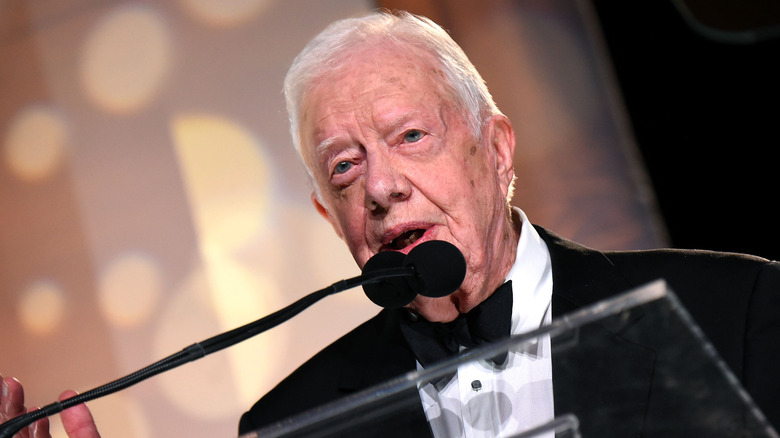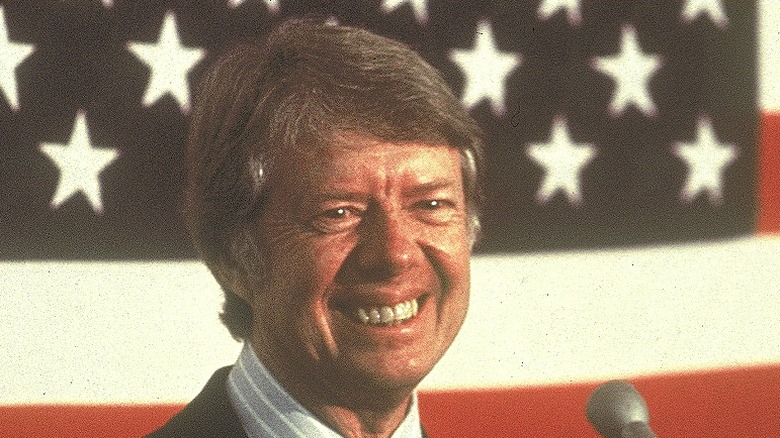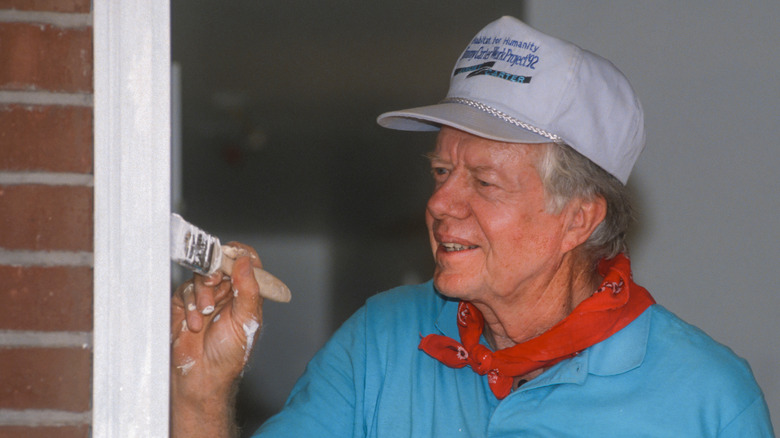Jimmy Carter Outlived Every Other U.S. President After Leaving Office
President Jimmy Carter died on December 29, 2024, at age 100. His son, James E. Carter III, revealed that he passed away at home. According to The New York Times, Carter suffered multiple health issues during the years leading to his death, including numerous falls and "a bout with the skin cancer melanoma, which spread to his liver and brain."
"I saw both of my grandparents yesterday. They are at peace, and—as always—their home is full of love. Thank you all for your kind words," the president's grandson, Senator Jason Carter, tweeted on February 18th, along with The Carter Center's announcement that the 39th President of the United States had entered hospice care at his home in Georgia. "After a series of short hospital stays, former U.S. President Jimmy Carter decided to spend his remaining time at home with his family and receive hospice care instead of additional medical intervention," their statement reads. "The Carter family asks for privacy during this time and is grateful for the concern shown by his many admirers," they concluded.
USA Today reports that following the death of President George H.W. Bush in November 2018, Carter became the longest-living president in U.S. history. In addition, Jimmy Carter outlived every other U.S. President after leaving office. And Carter's life after the White House was almost as busy as his presidency had been.
Jimmy Carter became a human rights champion after leaving office
Jimmy Carter became president in November 1976, following a close campaign against the incumbent Republican President Gerald Ford. Carter's one term in office was ended by Ronald Reagan, who was elected the 40th President of the United States in November 1980. Carter was out, but he was far from over. The former peanut farmer returned home to sleepy Georgia and kept busy throughout his retirement, rarely coming up for breath. Carter turned his hand to writing and was the author of 32 books — his final memoir, "Faith: A Journey for All," was published in 2018.
However, President Carter is best remembered for his humanitarian work. In 1982, he launched The Carter Center along with his wife, Rosalynn Carter. The non-partisan and non-profit organization is dedicated to helping "improve life for people in more than 80 countries by resolving conflicts; advancing democracy and human rights; preventing diseases; and improving mental health care."
In his quest to bring about global peace, Carter traveled worldwide on diplomatic missions, including reporting on illegal voting practices in Panama and ensuring a transition of power in Haiti. Carter was awarded the 2002 Nobel Peace Prize for his human rights endeavors. "War may sometimes be a necessary evil," he said in his acceptance speech (via Politico). "But no matter how necessary, it is always an evil, never a good. We will not learn to live together in peace by killing each other's children."
Jimmy Carter wanted to be remembered for his philanthropy not politics
Jimmy Carter was tireless in his human rights and philanthropy work. According to The Carter Library, he engaged in conflict mediation worldwide, dedicated one week every year to Habitat for Humanity, an NPO that assists the poor to "renovate and build homes for themselves," taught Sunday school, and worked as a church deacon.
Despite The Carter Center's commitment to bi-partisanism, its founder was vocal about his personal political views, sometimes with surprising results. They were both Democrats, but Carter's relationship with Barack Obama was strained. He admitted to NBC News that Obama was the only sitting president who hadn't asked him for advice. Carter explained they clashed over his post-presidential diplomatic work. However, there was no surprise regarding his thoughts on Obama's successor. In 2020 it was made clear how Carter really felt about Donald Trump when he declared it would be "a disaster" if 45 won a second term.
However, Carter wanted to be remembered for his philanthropy, not politics. "I'd like to be judged primarily by our work at the Carter Center for the last 32 years," he told Parade, 11 years after winning the Nobel Prize, adding, "I don't mean to exclude the White House. But in my more self-satisfied moments, I think about our unwavering promotion of peace and human rights."
Carter is survived by his wife Rosalynn, three sons, one daughter, nine grandsons (one deceased), three granddaughters, five great-grandsons, and eight great-granddaughters, per The Carter Library.



